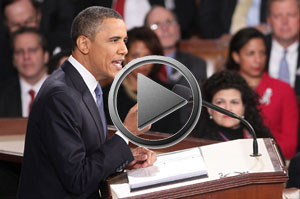President Barack Obama spent several minutes of his State of the Union address discussing health care and the new law. Here are those excerpts:
To reduce barriers to growth and investment, I’ve ordered a review of government regulations. When we find rules that put an unnecessary burden on businesses, we will fix them.
(APPLAUSE)
But I will not hesitate to create or enforce commonsense safeguards to protect the American people.
(APPLAUSE)
That’s what we’ve done in this country for more than a century. It’s why our food is safe to eat, our water is safe to drink, and our air is safe to breathe. It’s why we have speed limits and child labor laws. It’s why last year we put in place consumer protections against hidden fees and penalties by credit card companies and new rules to prevent another financial crisis. And it’s why we passed reform that finally prevents the health insurance industry from exploiting patients.
(APPLAUSE)
Now, I have heard rumors that a few of you still have concerns about our new health care law.
(LAUGHTER)
So let me be the first to say that anything can be improved. If you have ideas about how to improve this law by making care better or more affordable, I am eager to work with you. We can start right now by correcting a flaw in the legislation that has placed an unnecessary bookkeeping burden on small businesses.
(APPLAUSE)
What I’m not willing to do — what I’m not willing to do is go back to the days when insurance companies could deny someone coverage because of a pre-existing condition.
(APPLAUSE)
I’m not willing to tell James Howard, a brain cancer patient from Texas, that his treatment might not be covered. I’m not willing to tell Jim Houser, a small-business man from Oregon, he has to go back to paying $5,000 more to cover his employees. As we speak, this law is making prescription drugs cheaper for seniors and giving uninsured students a chance to stay on their patients’ — parents’ coverage.
(APPLAUSE)
So I say to this chamber tonight, instead of re-fighting the battles of the last two years, let’s fix what needs fixing and let’s move forward.
(APPLAUSE)
Now, the final, critical step in winning the future is to make sure we aren’t buried under a mountain of debt.
We are living with a legacy of deficit-spending that began almost a decade ago. And in the wake of the financial crisis, some of that was necessary to keep credit flowing, save jobs, and put money in people’s pockets. But now that the worst of the recession is over, we have to confront the fact that our government spends more than it takes in. That is not sustainable. Every day, families sacrifice to live within their means. They deserve a government that does the same.
(APPLAUSE)
So tonight, I am proposing that, starting this year, we freeze annual domestic spending for the next five years. Now, this would reduce the deficit by more than $400 billion over the next decade and will bring discretionary spending to the lowest share of our economy since Dwight Eisenhower was president. … I recognize that some in this chamber have already proposed deeper cuts, and I’m willing to eliminate whatever we can honestly afford to do without. But let’s make sure that we’re not doing it on the backs of our most vulnerable citizens. …
(APPLAUSE)
The bipartisan fiscal commission I created last year made this crystal clear. I don’t agree with all their proposals, but they made important progress. And their conclusion is that the only way to tackle our deficit is to cut excessive spending wherever we find it, in domestic spending, defense spending, health care spending, and spending through tax breaks and loopholes.
(APPLAUSE)
This means further reducing health care costs, including programs like Medicare and Medicaid, which are the single biggest contributor to our long-term deficit. The health insurance law we passed last year will slow these rising costs, which is part of the reason that nonpartisan economists have said that repealing the health care law would add a quarter of a trillion dollars to our deficit.
Still, I’m willing to look at other ideas to bring down costs, including one that Republicans suggested last year: medical malpractice reform to rein in frivolous lawsuits.
(APPLAUSE)
